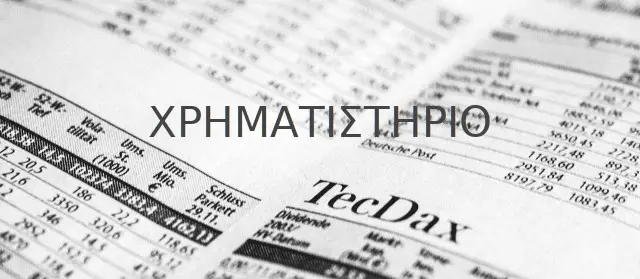
Το χρηματιστήριο είναι μια οργανωμένη αγορά που συνδέει τους επενδυτές που αγοράζουν και πωλούν επενδυτικά στοιχεία όπως είναι οι μετοχές, οι μετοχές είναι μερίδια ιδιοκτησίας σε ανώνυμες εταιρείες στις οποίες έχει γίνει η εισαγωγής του στο χρηματιστήριο.
Τι είναι το χρηματιστήριο και οι χρηματιστηριακοί δείκτες;
Ο όρος χρηματιστήριο αναφέρεται στην οργανωμένη αγορά διαπραγμάτευσης μετοχών, και η απόδοση του αντικατροπτίζεται από ένα κύριο χρηματιστηριακό δείκτη που είναι ο Γενικός Δείκτης. Οι χρηματιστηριακοί δείκτες περιλαμβάνουν μερικές αντιπροσωπευτικές μετοχές και ο σταθμικός μέρος όρος της απόδοση τους δείχνει μια γενικό εικόνα για το πως κινούνται γενικά οι μετοχές σε μια χρηματιστηριακή αγορά.
Στις εφημερίδες οικονομικής ενημέρωσης συχνά αναφέρεται ότι το χρηματιστήριο κινήθηκε καθοδικά ή αγορά έκλεισε με άνοδο. Αυτό σημαίνει οι χρηματιστηριακές δείκτες κινήθηκαν ανοδικά ή καθοδικά δηλαδή οι μετοχές που περιλαμβάνονται στο κάθε δείκτη έχασαν ή κέρδισαν αξία ως ένα σύνολο.
Οι επενδυτές που αγοράζουν και πωλούν μετοχές προσπαθούν να βγάλουν κέρδος από αυτή τη διακύμανση στη μεταβολή στις τιμές των μετοχών και από τα μερίσματα διανέμουν οι επιχειρήσεις. Το είδος του χρηματιστηριού που αναφερόμαστε είναι αξιών, επιπλέον υπάρχουν και άλλα είδη όπως είναι το χρηματιστήριο παραγώγων όπου λαμβάνει η χώρα η αγοροπωλησία συμβολαίων μελλοντικής εκπλήρωσης και δικαιωμάτων προαίρεσης.
Πως λειτουργεί το χρηματιστήριο;
Η λειτουργία του χρηματιστηρίου για την αγορά μετοχών είναι απλή. Πρακτικά λειτουργεί ως ένα οίκος δημοπρασίας όπου οι αγοραστές και πωλητές διαπραγματεύονται τιμές για να ανταλλάξουν μετοχές σε τιμές έρχονται σε συμφωνία, στη σύγχρονη εποχή αυτή η διαδικασία πραγματοποιείται από υπολογιστικά συστήματα
Στην Ελλάδα υπάρχει το Χρηματιστήριο Αξιών Αθηνών, εκεί οι ανώνυμες εταιρείες εισάγουν μέρος των μετοχών μέσα από μια συγκεκριμένη διαδικασία. Η προσφορά και ζήτηση καθορίζει την τιμή της κάθε μετοχής που διαπραγματεύεται ή αλλιώς το επίπεδο όπου οι επενδυτές, διαπραγματευτές που θέλουν να πουλήσουν ή να αγοράσουν.
Οι δυνητικοί αγοραστές δίνουν μια προσφορά για μια μετοχή δηλαδη την υψηλότερη τιμή στην οποία θέλουν να αγοράσουν ονομάζετε bid το οποίο είναι συνήθως χαμηλότερο από την προσφορά που δίνουν οι πωλητες που αντίστοιχα ονομάζεται ask. Αυτή η διαφορά ονομάζεται bid-ask spread. Για να γίνει εκκαθάριση και ανταλλαγή θα πρέπει να βρεθεί μια κοινή τιμή για την οποία τα δύο αντισυμβαλλόμενα μέρη ο αγοραστής χρειάζεται να αυξήσει το bid και ο πωλητής να μειώσει το ask.
Αυτη η διαδικασία γίνεται αυτόματα μέσα από ηλεκτρονικα συστήματα που καταγράφουν το bid και τα ask στο order book όπου οι εντολές για το ask απεικονίζουν τη προσφορά και για το bid τη ζήτηση.
Η κάθε συναλλαγή αφορά μία συγκεκριμένη μετοχή και η τιμή της επηρεάζεται από την χρηματοικονομική εικόνα της επιχείρησης, τα κέρδη, επενδύσεις κτλ. Αλλά γενικά οι τιμές ενός υποσυνόλου μετοχών του χρηματιστηρίου μπορούν να επηρεάζονται από νέα, οικονομικά γεγονότα ή οικονομικές καταστάσεις που αφορούν σε τομείς της οικονομίας που δραστηριοποιούνται.
Short-selling
Μια επιπλέον περίεργη έννοια είναι το short selling όπου οι επενδυτές δανείζονται μετοχές για να τις πουλήσουν αλλά στη συνέχεια έχουν την υποχρέωση να τις αγοράσουν πίσω και να τις επιστρέψουν. Αυτη τη τεχνική χρησιμοποιείται από επενδυτές για να βγάλουν κέρδος από τη πτώση των τιμών μιας μετοχής, για να δανειστούν απευθύνονται σε εξειδικευμένο τμήμα μια χρηματηστηριακής που ονομάζεται stock loan deparτment.
Θεμελιώδης vs Τεχνική ανάλυση
Η ανάλυση των χρηματηστηριακών μετοχών αξιών μπορεί να γίνει χρησιμοποιώντας δύο μεθόδους ανάλυσης
1. Θεμελίωδης ανάλυση: είναι η ανάλυση σε εταιρείες όπου καθορίζεται η εκτίμηση για την αξία τους χρησιμοποιώντας στοιχεία που προκύπτου απο αριθμοδείχτες χρησιμοποιώντας χρηματοοικονομικές καταστάσεις όπως είναι ο ισολογισμός, η κατάσταση ταμειακών ροών για το προσδιορισμός της ελεύθερης ταμειακής ροής και η κατάσταση αποτελεσμάτων χρήσης και η κατασταση μεταβολών καθαρής θέσης.
2. Τεχνική ανάλυση: Είναι η μέθοδος με την οποία γίνεται εκτίμηση της κατάστασης μέσω από μια σειρά στατιστικών τεχνικών και ανάλυσης διαγράμματων που προκύπτουν από τις ιστορικές τιμές
Γιατι πεφτει το χρηματιστηριο σημερα
Η πτώση των τιμών εταιριών μπορεί να οφείλετε βραχυπρόθεσμα από τη μείωση αύξηση της προσφοράς και της μείωση της ζήτησης των μετοχών για τον οποιοδήποτε λόγω αλλά, ακόμα και τεχνικού κερδοσκοπικούς σκοπους από τους συμμετέχοντας, σε και μακροπρόθεσμα από την μείωση της αξίας των εταιριών όπως αυτά φαίνεται στις χρηματοοικονομικές καταστάσεις, αλλά και αυτό προκύπτει η Efficient-market hypothesis δηλαδή η πλήρης πληροφορία ενσωματώνεται στις τιμές.
Προϋποθέσεις για εισαγωγή στο Χρηματιστήριο Αξιών Αθηνών
Η εισαγωγή μια εταιρείας σε οργανωμένες αγορές απαιτεί να πληρούν μια σειρά από αυστηρές προϋποθεσεις, όπως είναι
- Τα ίδια κεφάλαια είναι μεγαλύτερα του 3.000.000€
- 3 δημοσιευμένες συνεχόμενες διαχειριστικές χρήσεις με υπογραφή ελεγκτικής εταιρείας
- ΕBITDA (Earnings Before Interest, Tax, Depreciation and Amortization) της τριετίας της να είναι ύψους 6.000.000€
- Επαρκή διασπορά μετοχών
- Φορολογικός έλεγχος δημοσιευμένες ετήσιες οικονομικές καταστάσεις κατάρτιση ισολογισμού κατάσταση αποτελέματα χρήσης και τις υπόλοιπες που αφορούν τις μεγάλες οντόντητες)
- Δεύσμεση (Lock-up), εκτιμώμενη κεφαλαιοποίηση < € 100 εκ., οι μέτοχοι > 5%, επιτρέπεται να μεταβιβάσουν κατά το 1ο έτος μετά την εισαγωγή, μετοχές που αντιστοιχούν κατ' ανώτατο όριο στο 25% του συνόλου των μετοχών τους.
Αν δεν μπορεί να τα πληρεί αυτά κριτήρια μπορει να συμμετέχει σε πολυμερή μηχανισμός διαπραγμάτευσης Νόμος 4514/2018 δηλαδή την εναλλακτική αγορά
Αγορά μετοχών και φορολογία
Η αγορά μετοχών από το χρηματιστηρίο δεν υπόκειται σε φορολόγιση αλλά αποτελεί τεκμήριο. Η φορολόγηση προκύπτει όταν γίνεται πώληση μετοχών και υπάρχουν κέρδη δηλαδή υπεραξία κεφαλαίου δηλαδή Εισόδημα από Υπεραξία Μεταβίβασης Κεφαλαίου ή εισόδημα από διανομή μερισμάτων